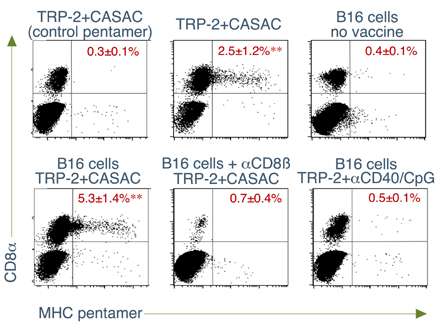Your basket is currently empty!
New-adjuvant
Case Study:
New adjuvant drives unprecedented cytotoxic T cell response providing a potent vaccine development platform

Wells, J. (pictured left) et al. (2008). Combined Triggering of Dendritic Cell Receptors Results in Synergistic Activation and Potent Cytotoxic Immunity. J. Immunology. 181(5): 3422-3431.
[PubMedID: 18714014]
Wells et al. investigated novel combinations of vaccine adjuvants and using Pro5® MHC Class I Pentamers, showed that optimal antigen-specific responses can be achieved using well-tolerated compounds that result in dendritic cell activation through the activation of toll-like receptors.
Initially using the ovalbumin H-2Kb/SIINFEKL epitope as a model, Pentamer staining indicated that a vaccine adjuvant referred to as a ‘combined adjuvant for synergistic activation of cellular immunity’ (CASAC) provided the greatest antigen-specific response as indicated by H-2Kb/SIINFEKL Pentamer+/CD8+ T cell staining. The vaccination also induced a strong memory response upon re-injection of SIINFEKL peptide as measured by Pentamer staining. The CASAC adjuvant contained several key components including two toll-like receptor agonists (e.g. CpG DNA+monophosphoryl lipid A), IFN-gamma and CD40 antibody or a class II MHC peptide to induce IL-12 production from dendritic cells. This was combined with SIINFEKL peptide in an emulsion.
The efficacy of the CASAC adjuvant was further tested on a mouse melanoma model using the TRP-2 tumour epitope (H-2Kb/SVYDFFVWL), which is known to bind with a low affinity to the H-2Kb allele. Mice were injected with B16 melanoma cells and then immunized with TRP-2 peptide suspended in either CASAC or the most potent adjuvant combination previously described (anti-CD40 and a single TLR agonist). Pentamer-binding CD8+ cells were only detected in mice that had received the CASAC adjuvant. Protection from tumours was maintained after further challenge with B16 melanoma cells.
 |
CASC induces potent tumor protection in a melanoma treatment model mediated partly but not entirely by tumor-Ag specific T cells. The figure shows staining of TRP-2 specific CD8 T cells in blood of mice using TRP-2(180-188) H-2Kb Pentamer. SIINFEKL Pentamer was used for the negative control stain. Mean percentage + SEM from 6-8 mice is shown.
Copyright 2008 The American Association of Immunologists Inc. **p<0.005 as determined by unpaired Student’s t tests on the mean values. |
The use of Pro5® MHC Pentamers to measure antigen-specific T cell responses accurately enabled the investigators to demonstrate that a combinatorial adjuvant approach may provide more effective protection than current anti-cancer vaccine strategies.
